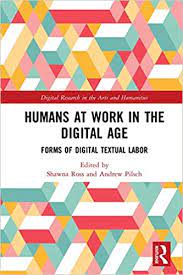

Most ebook files are in PDF format, so you can easily read them using various software such as Foxit Reader or directly on the Google Chrome browser.
Some ebook files are released by publishers in other formats such as .awz, .mobi, .epub, .fb2, etc. You may need to install specific software to read these formats on mobile/PC, such as Calibre.
Please read the tutorial at this link: https://ebookbell.com/faq
We offer FREE conversion to the popular formats you request; however, this may take some time. Therefore, right after payment, please email us, and we will try to provide the service as quickly as possible.
For some exceptional file formats or broken links (if any), please refrain from opening any disputes. Instead, email us first, and we will try to assist within a maximum of 6 hours.
EbookBell Team

4.0
66 reviewsHumans at Work in the Digital Age explores the roots of twenty-first-century cultures of digital textual labor, mapping the diverse physical and cognitive acts involved, and recovering the invisible workers and work that support digital technologies.
Drawing on 14 case studies organized around four sites of work, this book shows how definitions of labor have been influenced by the digital technologies that employees use to produce, interpret, or process text. Incorporating methodology and theory from a range of disciplines and highlighting labor issues related to topics as diverse as census tabulation, market research, electronic games, digital archives, and 3D modeling, contributors uncover the roles played by race, class, gender, sexuality, and national politics in determining how narratives of digital labor are constructed and erased. Because each chapter is centered on the human cost of digital technologies, however, it is individual people immersed in cultures of technology who are the focus of the volume, rather than the technologies themselves.
Humans at Work in the Digital Age shows how humanistic inquiry can be a valuable tool in the emerging conversation surrounding digital textual labor. As such, this book will be essential reading for academics and postgraduate students engaged in the study of digital humanities; human-computer interaction; digital culture and social justice; race, class, gender, and sexuality in digital realms; the economics of the internet; and technology in higher education.